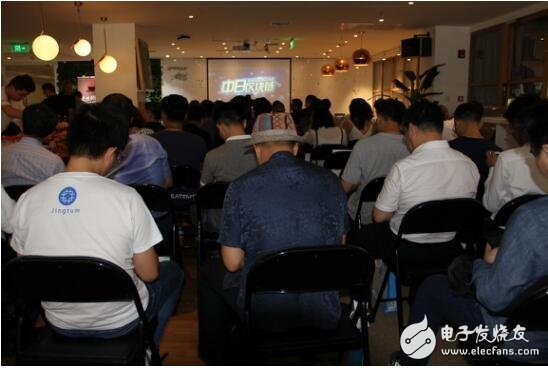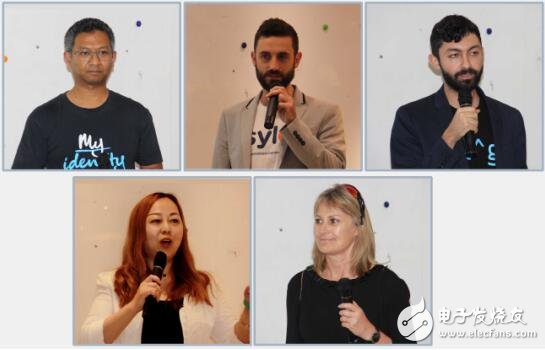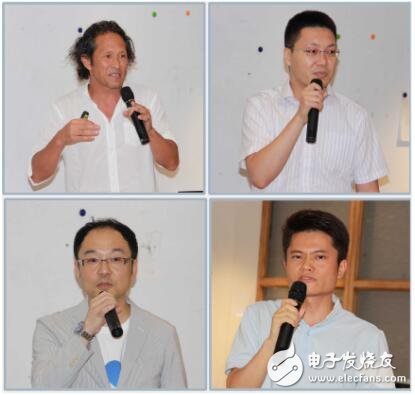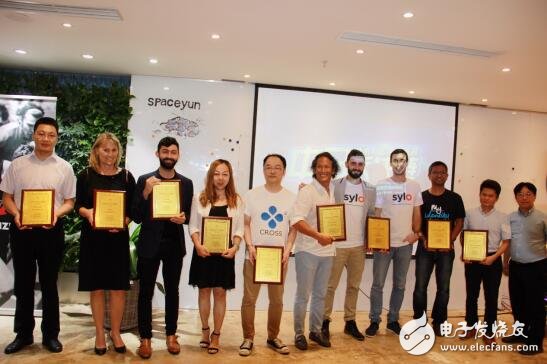On the afternoon of July 28, 2018, "BlockStar" and "Asian Blockchain Digital Currency Association" jointly hosted the "China-Japan Blockchain Technology and Application Exchange Conference", Golden Finance, Mars Finance, Wandian Caijing, Broadchain Finance, and Worldchain Finance attended as strategic media, and the conference was successfully held in the "Yunxiangke Space", Jianguomenwai Street, Beijing. The purpose of this event is to promote the global cooperation and development of the blockchain industry and promote the technology landing and innovation of the blockchain in the application field.

Participating in this international conference are Yang Jianxin, CTO of Jingtong Foundation, Hiroyuki Oomori, President of Asia Blockchain Digital Association, Tang Ze, founding partner of Ruoshui Enmiao Investment Fund, He Xiang, Managing Director of Chase Securities, and Kelvin Chandran, Co-founder of SingleSource , Ben Jordan, Sylo product director, Kerrl Mcmaster, ARDA co-founder, Ahmed Hilali, Plug technology leader, Kazutomo Robert Hori, KIZUNA CEO, Chang Yonghong, founder of Feirui Technology, Chen Biao, partner of Law Chain, Guo Cheng, CEO of Bihao Exchange , CallChain partner Yao Xingyu and many other heavyweight guests.
Among them, 9 blockchain project representatives from all over the world made in-depth exchanges and sharing at the meeting, which further advanced the application and development of blockchain technology in the world.
Before the meeting, Hiroyuki Oomori, President of the Asian Blockchain Digital Currency Association, delivered a speech as the co-sponsor.
Hiroyuki Oomori pointed out that the original intention of holding this event was to build an open, accurate, and in-depth interactive blockchain industry international exchange platform for participants from all countries. These events will continue to be held in Tokyo, South Korea, Europe and other countries.

(Five guests shared in the first half)
The first guest to share was Ben Jordan, product owner from Sylo, with the topic "Sylo-Decentralized Encrypted Communication Tool".
Is the online information shared daily by users stolen? How to communicate more securely and privately online? Avoid the interruption of all kinds of advertisements and useless information?
According to Ben Jordan, the Sylo they created can solve the above problems. Through a Sylo confidential communication protocol, a completely decentralized autonomous communication and storage network, a peer-to-peer (P2P) connection is created. Individuals can interact secretly and exchange data. Enterprise users can also participate.
At present, this decentralized encrypted communication tool has been launched. Users can search for the Sylo application through the App Store and Google Play Store and download it to Apple and Android devices. In terms of communication, peer-to-peer communication services such as secure voice calls, video calls, and messaging have been implemented, and currently have tens of thousands of users worldwide.
The second one is Kelvin Chandran, the co-founder of SingleSource, to share "A New Generation of Decentralized Identity Verification System".
Kelvin Chandran believes that everyone should control their personal data-which means that individuals can get the right services regardless of age, stage, status, gender, race or location.
Because of this, SingleSource uses blockchain technology to create a trusted digital identity for people, enterprises and devices, which can be used on different platforms (legacy databases and blockchain) and channels (mobile, web, Internet of Things) all over the world Used in. It also securely stores and shares relevant information while protecting the privacy of users, and at the same time returns control of identification data to end users and allows them to control who they share personal information with.
Currently, the SingleSource team uses SingleSource's risk scoring engine and authentication model to solve the trust problem, allowing users and service providers to conduct transactions in a safe and transparent manner, thereby reducing risks and building trust. The risk-sharing engine provided by SingleSource has processed $300 million in transactions for Blockhaus, and the team expects that potential revenue will continue to increase in the coming months.
The third place is Ahmed Hilali, the technical person in charge of Plug. The subject is "The Third Generation Public Network Technology Protocol-Plug".
According to Ahmed Hilali, Plug is an all-encompassing blockchain technology. It is a next-generation framework created to support the future of interconnected blockchains. Both are solving many security issues based on the current blockchain digital currency encryption technology. And scalability issues.
It uses the most popular programming language Python, allowing the creation of production-ready blockchain systems, using the blockchain layer in the technology stack, without the need for existing businesses to rewrite their systems to work in the blockchain paradigm, so that the block The working environment of the chain network is more like the Internet. Therefore, Plug means more than just fast transactions per second. It is also a flexible framework, a global, scalable BlockChain that can evolve as the blockchain ecosystem matures.
Plug as a global team, some of the largest companies in the world are currently cooperating with Plug to build DApps and their commercial blockchain solutions on the underlying chain-such as infinvision, McDonald's, Wanda Group, Bailian Group, Downer Wait.
Kerrl Mcmaster, co-founder of ARDA, is the fourth guest to share "ARDA-Rewarding Healthy Behaviors".
Kerrl Mcmaster said that for more and more people who use wearable devices, service providers currently do not know the most appropriate time for customer activities; the original data is not clear, and the health center has not participated in processing the data; the data is collected by the manufacturer, and Some problems such as non-user self-management are shrouded.
Therefore, the founder of Arda established the world's first sports science research institute with more than 30 years of experience in sports data analysis. Arda's AI Platform analyzes raw sports data and uses smart contracts to support user activity data sharing based on participating in sports and health ecosystems. It also uses its own method to enrich the IP portfolio with sports data, and uses blockchain technology as the basis to serve users and create a healthy ecological sports system.
At present, Arda Platform has obtained cooperation licenses with companies such as Intel, OAKLEY, New Balance, LifeBEAM, and Centrality.
The fifth is Yao Xingyu, a partner of CallChain, who brought the theme "How Blockchain Restores the Truth of Pan-Entertainment".
Piracy? Box office fraud? Yin and Yang contract? IP infringement? No support for niche IP? A series of entertainment industry problems are difficult to solve in the traditional economic environment.
For this reason, Yao Xingyu believes that CallChain, as a public chain in the pan-entertainment industry, builds a credible, transparent, true, and democratic pan-entertainment new value through the basic characteristics of blockchain technology such as distributed, decentralized, open, transparent, and non-tamperable. Ecologically, to create a decentralized pan-entertainment platform based on blockchain technology to provide a value circulation hub for the global pan-entertainment community, thereby changing the chaos of the industry, restoring the real pan-entertainment commercial value, and finally realizing my entertainment.
Among them, through CallChain's killer application "one-click issuance of personal tokens", everyone can issue personal tokens and everyone can become IP, which will extend the new business form of unlimited imagination.

(Four guests shared in the second half)
KIZUNA CEO Kazutomo Robert Hori, as the first guest in the second half, shared "KIZUNA's Social Network".
Robert Hori said that today’s sports social network services exist so that athletes can transmit information to as many people as possible, but these social networks cannot create any real connection between athletes and fans, and provide too much help. .
KIZUNA’s social network is a real-time communication platform for athletes and fans to establish a real connection. The platform connects and utilizes scattered personal power to support athletes suffering from financial difficulties. KIZUNA will exist as a center that can benefit athletes, citizens (fans) and social enterprises, and utilize the market growth power of cryptocurrency to provide KIZUNA services for athletes and fans.
The second place is Guo Cheng, CEO of BIHAO Exchange, sharing the theme of "Social Weak Centralized Exchange".
Guo Cheng said that digital currency exchanges are emerging one after another. The current operating rules of first- and second-tier exchanges are not transparent, and the cost of listing is extremely high. Because of the high cost of listing, many high-quality projects with little funds are unbearable. The recent operating models of small exchanges are mostly based on the so-called trading and mining dividends. In fact, it is the asset securitization of handling fee dividends, and the high return of the price of platform currency and handling fee is still unsustainable.
He also analyzed that for the project party: the cost of listing is low, the rules for listing are transparent, and the common development needs of the community, project parties and exchanges urgently need to be met. For users: stable and secure transaction requirements, relatively transparent, and revenue-sharing community operation requirements are the current pain points of exchanges in the market competition.
To solve the above problems, BIHAO Exchange focuses on creating a safe, stable and professional digital asset trading platform. The issued platform currency is the right to profit, and the value of the platform currency will continue to be enhanced, and the revenue will be shared in community operation, weak centralization, and full voting decision-making operations to achieve a balanced development of transparency and democracy.
The third person to appear is the consultant of CROSS, the chairman of Hiroyuki Oomori of the Asian Blockchain Digital Encryption Currency Association, who brings you "CROSS—Providing a Decentralized Value Exchange Platform for Enterprises".
CROSS is an early project initiated by Guild. It is a "decentralized value exchange platform". CROSS has developed Cross valueTools to perform token value exchange. Its core innovative technologies include: a multi-function with PCT patented security technology Wallets, hybrid and decentralized exchanges, applications that prove the existence of products and record them on the blockchain, secure financial management systems, incubation centers where blockchain-related startups and engineers gather from all over the world, etc.
Cross will help realize a world in which anyone can trade with tokens, build a token economy in the real market, and help global users to realize a more convenient blockchain world together.
The last guest is Wang Junwei, the co-founder of the Lawyers Chain, sharing the theme "Recording and Discovering Legal Value".
The value of the original legal text is difficult to determine, the paid consultation law has no pricing, and the professional supervision of lawyer services is difficult... Can blockchain technology bring new changes to the lawyer industry?
Wang Junwei believes that the lawyer chain was born from this. It is based on blockchain distributed accounting technology, a legal community with lawyers as the theme, and through the token economy, allows users to discover and evaluate, and establish lawyers' digital assets and laws. The digital assets of the content and the gradual realization of legal services on the chain, such as online reading, online Q&A, and file services, can all be completed on the chain.
The traditional business value + model has caused lawyers to become more like businessmen, and the blockchain will have a new impact on the business model, organization and distribution of benefits of the lawyer industry, especially the discovery of more social value of the law.

Group photo of the collective parties of the blockchain project
At the end of the event, the conference organizer BlockStar and the Asian Blockchain Digital Currency Association will issue cooperation license plates with the 9 blockchain project representatives participating in the conference, and take a group photo to leave a message.
This conference will gather blockchain industry experts from various countries in Beijing. Through mutual exchanges and sharing, it will promote the innovation of the entire blockchain concept and technology, and reach a consensus in the atmosphere of industry resource exchange and international in-depth cooperation, and finally promote the world The pace of blockchain development will realize the vision of a win-win future!
Small computer system interface (SCSI) is an independent processor standard for system level interfaces between computers and intelligent devices (hard disks, floppy drives, optical drives, printers, scanners, etc.). SCSI is an intelligent universal interface standard.
In addition to SCSI, IDE is also a very common interface. From the point of view of ease of use, IDE is more suitable for ordinary users. In addition, personal computer users not only need to configure a few peripherals, but also do not require high speed. Therefore, it is more appropriate to choose IDE interface. In addition, IDE also has the characteristics of high performance price ratio and wide application. Although the SCSI interface has many incomparable characteristics, the price of the interface and its peripherals is too expensive to be borne by ordinary users, which determines the limitation of its actual use range.
1. The working mode of IDE requires the whole process participation of CPU. When the CPU reads and writes data, it can't perform other operations. In this case, in the multitask operating system of Windows 95 / NT, the system reaction will be greatly slowed down. The SCSI interface controls the data reading and writing operation completely through the independent high-speed SCSI card, so the CPU does not have to waste time to wait, which obviously can improve the overall performance of the system. However, IDE interface has also made great improvements to improve this problem. DMA mode can be used instead of PIO mode to read and write data. DMA channel is responsible for data exchange, which greatly reduces the CPU consumption. However, comparing the CPU utilization of SCSI and IDE, we can find that SCSI still has considerable advantages.
2. The scalability of SCSI is larger than that of IDE. Generally, each ide system can have two IDE channels, with a total of four IDE devices. The SCSI interface can connect 7-15 devices, much more than IDE, and the cable connected is far longer than ide.
3. Although the price of SCSI device is higher, compared with IDE, the performance of SCSI is more stable, durable and reliable.
SCSI Solder Type Section
ShenZhen Antenk Electronics Co,Ltd , https://www.antenkwire.com